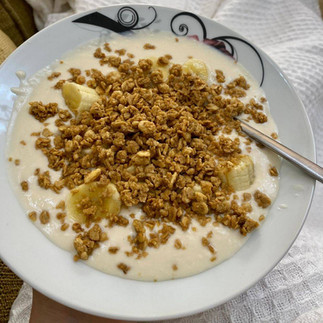- whitneykamerzel
- Aug 24, 2023
- 5 min read
Updated: Jan 11, 2024
Food Challenges After Arriving in Nigeria

Remember: All views and opinions expressed here are my own personal views and do not express the official views or opinions of the U.S. government. This is not an official resource. This is just a personal perspective and not everyone may agree.
We found out early that food was going to present difficulties for us in Nigeria. Here's a summary of some of our food-related challenges.
Originally published January 28, 2021
When we first arrived, our kind sponsors filled our fridge with essentials like milk and coffee. We were able to eat things like pizza from the “Filling Station” (our compound restaurant) downstairs when it opened on the weekends, but we had to figure out how to get real meals and snacks during the week. After quarantine, our friends took us to a nearby mall where there is a grocery store. We discovered another grocery store that many diplomats and expats shop at that has Western favorites like white flour and cream cheese, but prices were ~$10 for each. This location is usually saved for hard to find, much-needed items. One place we've enjoyed so far is a small Lebanese store with low prices. They have fresh pita and bread, a deli, hummus, and a convenience section akin to a CVS with medical items, shampoo, etc. I even found ice cream there yesterday and surprised Will!
After we figured out where to go, we needed to figure out how to get there. We don’t have a car and, for now, we are going to go without one. We found a few drivers that work for the embassy that drive us in their own car. Last weekend our driver friend brought us to a huge plant shop on the side of the road (very common here on roads and highways!) and stayed with us and negotiated with the locals to make sure we wouldn’t pay the “Western” price. Since we don't feel safe outside the compound at night and this leaves exploring the city mostly to the weekends, we will likely keep using a driver until we find a reason we absolutely need a car.
Now that we knew where to go and how to get there, we discovered more challenges with using and cooking the actual food. It made me truly grateful for the access to food we had in America. Unfortunately, many parts of Nigeria and West Africa suffer from food shortages and affordability. With this in mind, I am writing this post to express the early food challenges we faced serving in West Africa for the first time. Some examples include the following:
Fruits and veggies. The government advised us that any bought on the compound or out in local markets or grocery stores need to be soaked in bleach water for 15 minutes before being rewashed and dried. This keeps us safe from E.coli and other diseases. (Update: If I did it again I would seriously research vinegar or other solutions. We still got ecoli from the bleached stuff so keep in mind nothing is 100% going to do the trick.) Quality is another issue. I find that fruits taste better here, but don’t last as long. There are also little inconveniences that you never realized were handled for you in the West. For instance, I spend about an hour cutting a watermelon and was surprised to see it covered with thousands of seeds. I am a fruit lover so I spent the time picking them all out and rejoiced at my small pile of watermelon left over! This turned out to be a very funny task and it makes you appreciate the little things.
Meat. The only meat we eat here is chicken. Beef comes from a different type of cow here and smells and tastes very sweet. We've tried beef and pork from several sources and didn't like it, possibly because it is cleaned and prepared differently. Chicken usually comes whole and takes time to carve and cook. Since we are a family of two, we found it was easier to purchase pre-cut chicken and think this will be the way to go from now on. It's inexpensive for a pack of pre-cut chicken for a meal. We miss turkey burgers and tacos, though. However, we were lucky to find a reliable deli that has sliced turkey and cheese and have been using this for sandwiches!
Beans. Black beans and chick peas in cans are hard to find. I used to eat these with every meal. You can find them as raw, dried beans and cook them yourself. This is really easy to do if you have a pressure cooker. Without a pressure cooker, they can be a pain. I did this a few weeks ago and, while delicious, I found that it takes an entire evening to rinse and boil and have them sit out overnight. It’s something you need to plan ahead for and have some hours to dedicate to.
Bread and bagels. Bread here for some reason is VERY sweet and gives off a coconut smell. While Will and I don’t mind this sweet bread in small doses, we make several meat and cheese or peanut butter and jelly sandwiches a day that don’t go well with the sweet bread. A friend told us the trick in the grocery store is to check the ingredients and avoid all bread that places sugar before salt. The regular, saltier bread is much harder to find. Most friends on the compound make their own bread. We tried this with bagels (an aspirational goal for a first-time bread maker, I hear!) and found that you also need to find live yeast (easier said than done) and bread flour (same). After settling in, we now buy our bread exclusively from a popular expat grocery store that has a nice bakery.
Flour. White flour rarely exists here. You can find flour labeled as “meal,” or enriched with Vitamin A or from different bases/meant for different purposes like cassava or semo. We did find whole wheat flour yesterday, and were surprised to find that Bisquick (sent to us from Sam’s Club by my dad) makes a great substitute for self-rising flour. Right now we are using it for bread, pizza, cookies, and apple crisp deserts. Don’t knock it until you try it! Once we were settled, we found that shipping regular flour from the States was the easiest way to go.
Yoghurt. Greek yoghurt is rare here and regular yogurt is more like juice and very sweet. Our neighbors told us to start making our own. After spending a day and night in my pressure cooker boiling, cooling, and incubating yoghurt for the first time, it was a success!! We added vanilla extract and honey to sweeten it up and it’s worked great for us so far. I can't believe I'm only now discovering how easy it is to make this on your own.
Alcohol. The beer, wine, and liquor here is cheap and good. We were told the opposite and shipped some of our favorites, but so far we enjoy Star, a local Nigerian beer that comes in a lemon shandy flavor. We also frequently find good South African, Spanish, and other wine for ~$5/bottle.
Now that I've expressed our challenges, I can share that we found out our consumables shipment is arriving today! This means we will finally have access to the food we prepared and shipped several months ago. Not every post allows a consumables shipment and I can see why it’s needed here. Before departing for post, we spent several days at Walmart and Sam’s Club purchasing and packing up things like sauces (ketchup, hot sauce, bbq sauce), spices, cans (beans, chicken broth) and dried foods (pasta, quinoa, flour, stuffing mix) that we knew we would miss and that would likely be hard to find in Nigeria. We’re hoping that having these basic goods will alleviate some of our food challenges and allow us more time to explore fun things in Abuja!














































